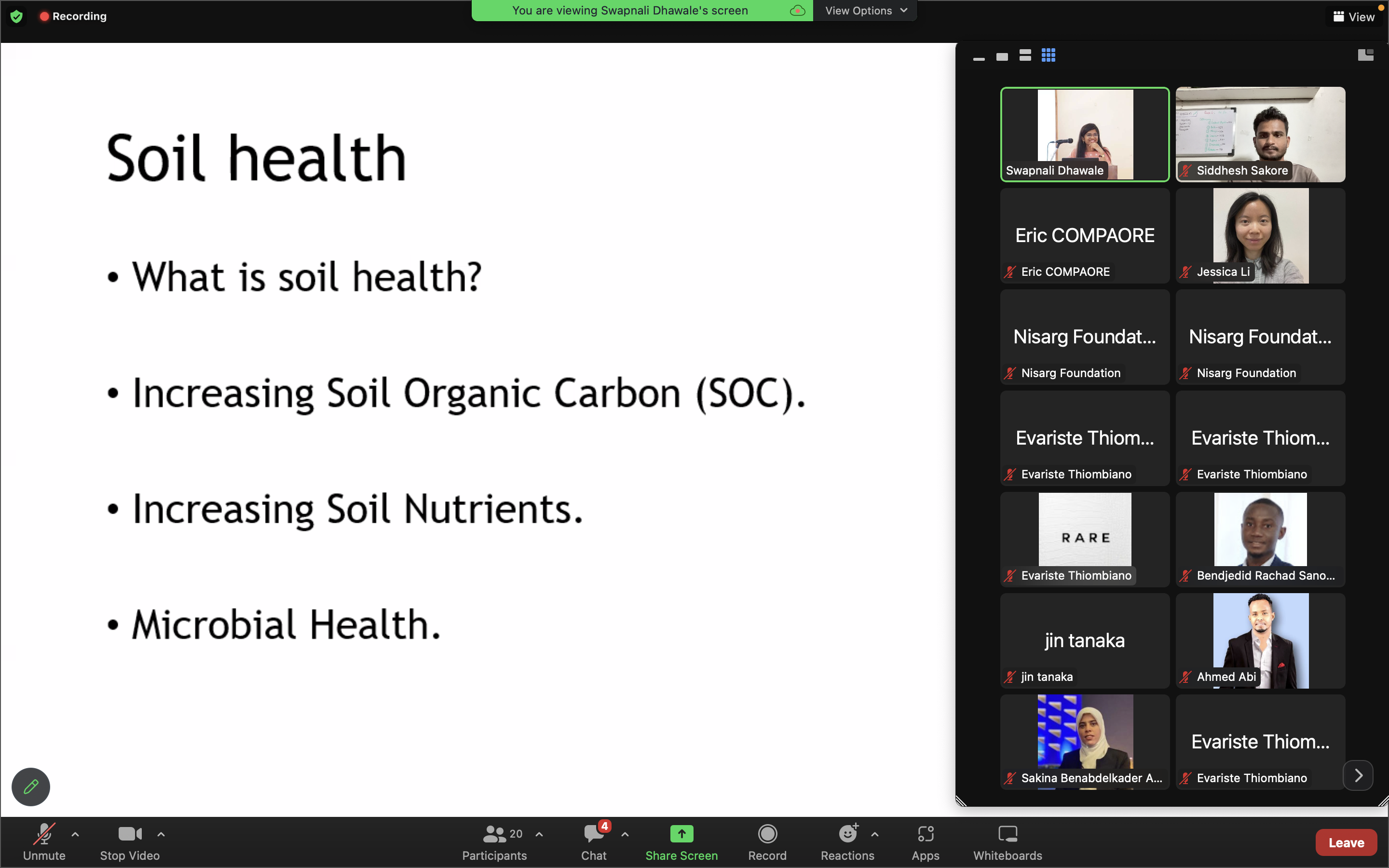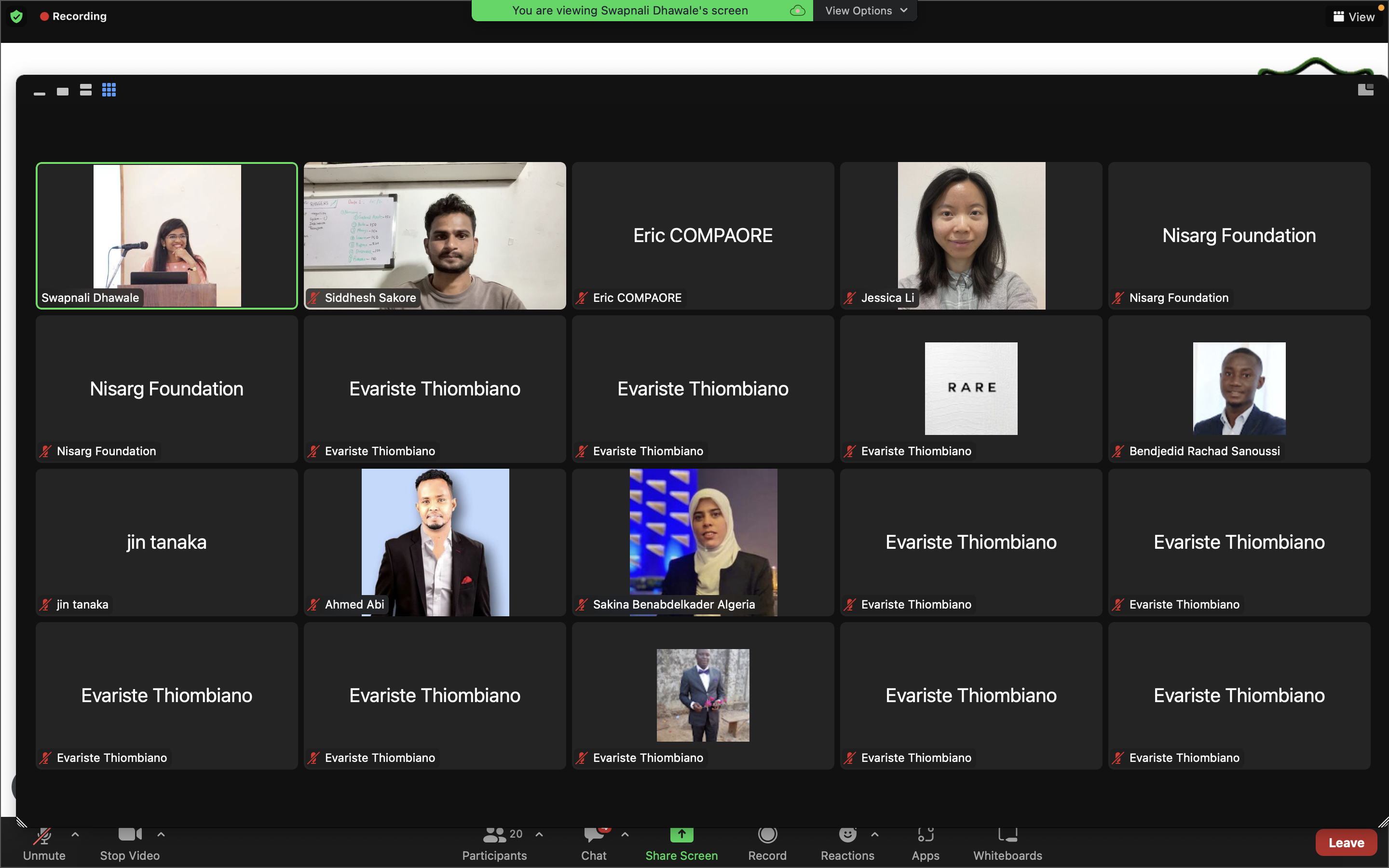The 3-day online training program on ‘Youth in Regenerative Agriculture,’ hosted in collaboration with the Nisarg Foundation, was a transformative experience for the approximately 20 participants hailing from 9 different countries. This diverse group consisted of students, farmers, social entrepreneurs, and journalists, all driven by a shared commitment to creating a positive impact through regenerative agriculture.

The workshop was designed to provide participants with comprehensive knowledge and practical tools to implement regenerative agriculture systems in their respective communities. Over the course of the program, various essential topics were covered in depth, ensuring a holistic understanding of the principles and practices of regenerative agriculture.
Soil health was a key focus of the workshop, as participants learned about the vital role of healthy soil in sustainable agriculture. They gained insights into techniques such as cover cropping, crop rotation, and composting, which promote soil fertility and biodiversity while reducing the need for synthetic inputs. By emphasizing the importance of regenerating soil health, the workshop aimed to empower participants to implement these practices and witness the long-term benefits they bring.

Water conservation was another crucial aspect addressed during the training program. Participants learned about efficient irrigation methods, rainwater harvesting, and the importance of managing water resources sustainably. By understanding the significance of responsible water use, participants were equipped with the knowledge to optimize irrigation practices and minimize water wastage, thereby contributing to both environmental preservation and the resilience of agricultural systems.
The workshop also highlighted the importance of biodiversity in regenerative agriculture. Participants explored the role of native plants, beneficial insects, and diverse cropping systems in fostering ecological balance and improving overall farm productivity. They learned about techniques such as agroforestry, polyculture, and habitat creation, which promote biodiversity while providing economic benefits to farmers. By embracing these approaches, participants were encouraged to create agricultural systems that mimic natural ecosystems, enhancing resilience and reducing dependence on external inputs.
In addition to technical knowledge, the workshop focused on community building and the social aspects of regenerative agriculture. Participants engaged in discussions and interactive sessions that emphasized the importance of collaboration, knowledge sharing, and supporting local communities. They explored innovative models of farming cooperatives, community-supported agriculture, and sustainable food systems. By fostering connections among participants and promoting the exchange of ideas, the workshop encouraged the formation of a global network of individuals passionate about regenerative agriculture.
The ultimate goal of the workshop was to empower the participants to become catalysts for change in their communities. By equipping them with the necessary knowledge, tools, and networks, the program aimed to inspire and enable participants to implement regenerative agriculture practices that address the challenges of food security, environmental degradation, and social inequality.

The success of the workshop lies not only in the knowledge gained but also in the relationships and collaborations formed. Participants left the program with a renewed sense of purpose and a strong network of like-minded individuals, ready to embark on their respective journeys as agents of change in the realm of regenerative agriculture.
We extend our gratitude to the Nisarg Foundation for their invaluable support in organizing this transformative training program. Together, we are fostering a new generation of empowered and passionate youth who will lead the way in creating a regenerative and sustainable future for agriculture and our planet as a whole.
ALL CONTACTS
- At Village - Dhamari, Dhamari-Pabal Road, Tehsil - Shirur, Dist. - Pune, Maharashtra, India - 410505
- +91 7709 920 155
- contact[at]agrorangers[dot]org
- siddhesh[at]agrorangers.org[dot]org
SUBSCRIBE
Subscribe to our newsletter to read quarterly newsletters
Gallery
- All Rights Reserved - Copyright 2022



Leave a Reply